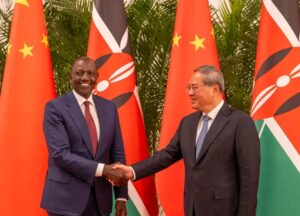
| Emmanuel Barasa |
The UK government has announced that 6,000 police officers are on standby to
respond to potential riots across the country.

This measure comes in response to rising concerns over public unrest amid ongoing political and economic challenges.
“We are prepared to deploy a significant number of officers to maintain law and
order,” stated Home Secretary Suella Braverman. The government has emphasized
that these preparations are precautionary and aim to ensure public safety. The move
underscores the seriousness with which authorities are addressing the potential for
widespread disturbances.
Recent incidents of unrest in various parts of the UK have prompted this robust
response. Tensions have been high due to a combination of factors, including
economic hardships, political dissatisfaction, and social inequalities. “We are seeing
a concerning trend of increasing public unrest,” noted Sir Mark Rowley,
Commissioner of the Metropolitan Police. The deployment plan is part of a broader
strategy to prevent escalation and protect communities. Police forces across the
country have been briefed and are ready to act if necessary.

The decision to place 6,000 officers on standby is based on intelligence and risk
assessments conducted by security agencies. These assessments indicate a
heightened risk of riots in several urban areas. “Our intelligence suggests that certain
groups are planning coordinated actions,” said Neil Basu, former Assistant
Commissioner for Specialist Operations. The government aims to deter potential
rioters by demonstrating its readiness to respond swiftly and effectively. This
proactive stance is intended to reassure the public and prevent the spread of
disorder.
In addition to the 6,000 officers on standby, the government has implemented other
preventive measures. These include increased surveillance, community engagement
initiatives, and stricter enforcement of public order laws. “We are working closely with
local authorities and community leaders to address underlying issues,” stated Priti
Patel, Secretary of State for the Home Department. These efforts are aimed at
reducing tensions and fostering dialogue between law enforcement and
communities. By addressing root causes, the government hopes to mitigate the risk
of unrest.
The public has been urged to remain calm and cooperate with authorities during this
period of heightened vigilance. Officials have emphasized that the deployment of
officers is a precautionary measure and not an indication of imminent danger. “We
ask for the public’s understanding and support as we take these necessary steps,”
urged Martin Hewitt, Chair of the National Police Chiefs’ Council. The government is
committed to protecting the rights of citizens while ensuring public safety.
Maintaining a balance between security and civil liberties remains a key priority.
The potential for riots has also drawn attention to broader social and economic
issues facing the UK. Many experts argue that addressing these underlying
problems is crucial for long-term stability. “Social unrest often stems from deep-
seated grievances and systemic issues,” explained Dr. Tim Newburn, a criminology
professor at the London School of Economics. The government has acknowledged
the need for comprehensive solutions to address economic inequality,
unemployment, and social exclusion. Efforts to address these issues are seen as
essential for preventing future unrest.
The deployment plan has received mixed reactions from political leaders and public
figures. Some have praised the government for its proactive approach to maintaining
order, while others have expressed concerns about potential overreach. “It’s
important that we ensure public safety without resorting to heavy-handed tactics,”
commented Keir Starmer, leader of the Labour Party. The debate reflects broader
discussions about the role of law enforcement in addressing social issues. Finding
the right balance between security and community engagement is a challenge facing
authorities.
Historical context also plays a role in the current preparations. The UK has
experienced significant riots in the past, such as the 2011 London riots, which
caused widespread damage and highlighted issues of social inequality. “We have
learned from past experiences and are better prepared to handle such situations
now,” noted Dame Cressida Dick, former Commissioner of the Metropolitan Police.
Lessons from previous incidents have informed current strategies to ensure a more
effective response. Authorities are determined to avoid a repeat of past mistakes and
to protect communities from harm.

International perspectives on the UK’s preparations for potential riots have also
emerged. Observers from other countries are watching closely to see how the UK
manages the situation. “The UK’s approach to handling public unrest can provide
valuable lessons for other nations,” stated Professor Clifford Stott, an expert in crowd
psychology. The international community is interested in the UK’s methods for
preventing and responding to civil disturbances. Sharing best practices and learning
from global experiences are seen as beneficial for addressing common challenges.
In conclusion, the UK government’s decision to place 6,000 police officers on
standby reflects a proactive approach to maintaining public order amid rising
tensions. The measure aims to prevent potential riots and ensure the safety of
citizens. “We are committed to safeguarding our communities and addressing the
underlying issues driving unrest,” affirmed Prime Minister Rishi Sunak. By combining
law enforcement readiness with efforts to tackle social and economic challenges, the
government hopes to achieve lasting stability. The situation highlights the importance
of a balanced approach to security and community engagement.






